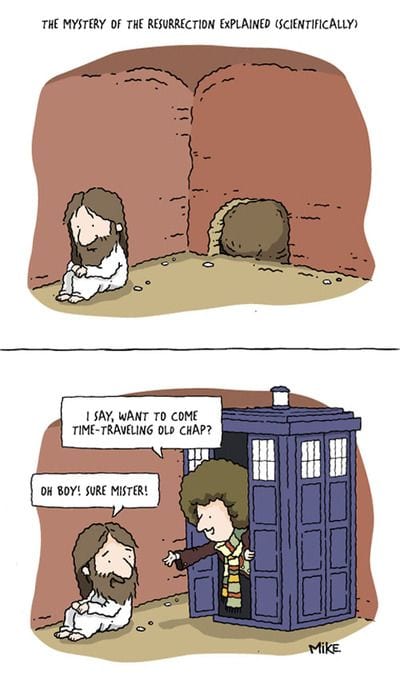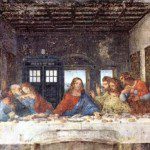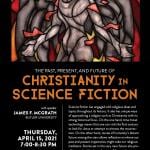My previous post shared the introduction to this public lecture. The first major section of this lecture focuses on the past, and so I gave it the section heading “Part One – Past: Were You There When They Crucified My Lord?”
I often tell the story of a thought experiment presented to me by a commenter on my blog, an atheist. His aim was to get at the issue of falsifiability, that is, the question of whether beliefs in general (and my beliefs in particular) are based in evidence and open to revision in light of new evidence or arguments. He thus offered me a time and space machine—let’s just call it a TARDIS—which could take me anywhere and anywhen I choose to go. It came with this question: What would it take to make you lose your faith? I took the question seriously, both as a Christian and as a science fiction fan. My first instinct was to go to the vicinity of Jerusalem in or around the year 33, to see whether anything extraordinary happened at a particular tomb one Sunday morning.
I soon realized (more clearly than I had when pondering the subject from historical and theological angles) that the question of what happened to the body of Jesus was not the same as the question of whether God vindicated Jesus beyond death. If Jesus had been thrown to dogs and devoured, would that prevent God from resurrecting him? If the disciples stole the body, would that necessarily mean that God did not vindicate Jesus in some manner beyond the grave? Thinking through the topic further, I realized more clearly than I had previously that my faith was something deeper than my allegiance to Christianity. If my beliefs changed (and I was fully convinced that they should and must change in light of evidence) then I could at some point reach a point where I would no longer categorize myself as a Christian. But my faith is ultimately something else. In the end my answer to the challenge was to say that if I went trillions of years back in time and trillions of years forward and saw that there was nothing, no God, no universe, nothing, that all our cosmic history is a blip that eventually vanishes leaving no trace, that would cause me to change my worldview in a more drastic way. My faith is about meaning and transcendence, and not ultimately about doctrine.
Some Christians say that if it were proven that Jesus did not rise from the dead, they would become atheists. Why is the only alternative they contemplate atheism and not Judaism, or Buddhism, or something else? Science fiction is often particularly good at problematizing false dichotomies and binaries. Religious rhetoric, on the other hand, has a penchant for false antitheses. An atheist’s sci-fi thought experiment involving a TARDIS, intended to challenge my faith, was instrumental in strengthening it and in helping me to understand it better. It eventually led to me writing a science fiction short story of my (included in my book Theology and Science Fiction) that imagines this scenario of time travel to the first century in more detail.
One particularly popular science fiction series at the moment is Doctor Who, a franchise I’ve already been alluding to in calling my time and space machine a TARDIS. The show has never featured episodes about the Doctor going to the time of Jesus. Yet it has hinted at him having done so more than once. Let’s watch clips from two different episodes of the show that allude to this:
It was customary for a while for Doctor Who to have specials at Christmas and/or Easter, when the program was otherwise between seasons. The episodes above make at least some reference to this. The first involves the Doctor on an alien ship that is visiting Earth and aware that Christmas is a special time there, but with a great deal of confusion about it and what it’s about. The Doctor does not offer an explanation akin to Linus’ in the famous Charlie Brown special. He only says very succinctly that it is a long story, which he knows because he was there—and got the last room. This is a comical hint that the Doctor, going to see the original Christmas, contributed to the story unfolding as it is recounted in the Gospel of Luke in English translations. New Testament scholars and informed laypeople of course know that the translation “inn” is problematic and that the nativity story in Luke is more likely set in a peasant home in which a manger, a feeding trough, would have been found in the home itself rather than a separate stable or barn. Doctor Who, just in passing, hints at the literal truth of the story as traditionally told, even though that is historically problematic. It also highlights in a fun way the paradox that those who go to see history may contribute to it. On the other hand, in the second clip, the Doctor takes a swipe at the awkwardness of Easter’s lack of fixed date, and hints that what “really happened” is not the story as anyone on Earth tells it or knows it. Time travel stories provide opportunities for literalism and faith becoming sight, for revisionism, and for paradoxical contributions of time travelers to the events they go to witness. Two very different examples of this in literature which are illustrative, and which you may care to read if you haven’t previously, are “Let’s Go to Golgotha” by Garry Kilworth and “Behold the Man” by Michael Moorcock.
Returning to Doctor Who, there is a cartoon that envisages the Doctor contributing to the rise of Easter beliefs.

It is ironic that the Doctor and his TARDIS are here invoked as though they were a “scientific explanation.” The Doctor’s TARDIS, like Star Trek’s warp drive and transporters, and Star Wars’ midichlorians and lightsabers, are not scientific. The question of how to define science fiction and what distinguishes it from fantasy is a longstanding one. If one travels to Narnia in a magic wardrobe, that’s fantasy. If you reach there through a wormhole opened by a quantum fluctuation, that’s science fiction. In some stories, as for instance those about Thor in the Marvel superhero universe, gods and aliens, miracle and science, are simply the same thing. It is never as far removed from fantasy as some of its adherents would like to believe.
Science fiction often finds itself situated—sometimes deservedly so, sometimes undeservedly—within the mythical war between science and religion. There certainly have been individuals—real-world scientists and clergy, authors and fictional characters—who have insisted one must choose one or the other. There are just as many if not more who see no need to do so and who illustrate that the choice is an unnecessary one.
When Star Trek presents a real Apollo who is “no god” but an alien from another planet, and Doctor Who does the same, envisaging real “Daemons” that are aliens, it is often perceived as challenging religion and presenting science as an alternative. Yet the stories are surprisingly literalistic, more so than any Classicist would be. Science fiction illustrates time and again the desire not to replace magic with science, but to embrace science while keeping the epic, heroic, mythical, and miraculous elements within that new framework. Yet merely inserting technobabble into stories of monsters and wizardry does not make them scientific. Far from illustrating a war between religion and science, it illustrates a desire for something that brings the two together in a meaningful way that can make sense of our existence.
I would be remiss if I did not mention that there is an audiobook about Doctor Who and the Council of Nicaea. I won’t retell the story here. I will mention, however, that the author, Caroline Symcox, is an ordained minister. Her husband is a Doctor Who author responsible for several famous episodes as well as many more stories in print. Faith and fandom intersect in their lives, in parish ministry, and in stories they tell.
There is also a very early episode of Doctor Who, “The Romans,” in which a character who helps the Doctor and his companions is shown to be a Christian (albeit through the historical anachronism of having him wear a cross around his neck).
When we imagine ourselves witnessing ancient events, whether as religious people or as historians, we are not doing something fundamentally different from science fiction, even if we do not invoke speculative technology to get us there. Science fiction provides helpful thought experiments for those whose interest in Christianity is historical rather than devotional. There are a lot of assumptions and misinformation that interfere with the public understanding of history. It is not science fiction that is primarily responsible for that. Can it help counter such trends? Doctor Who began as a show geared for children, with the aim of educating them about history and science. The Doctor Who Council of Nicaea audiobook encounters disagreements from those who know the history of that event well. Nevertheless, as with most biopics, documentaries, and other depictions based in history, however much things are oversimplified or one possibility is presented as though it were the only one and certain, it is usually the case that most viewers learn things they simply would not have otherwise. Science fiction can be a teaching tool, and at times a particularly effective one precisely because those watching, listening, or reading don’t view it as education but as entertainment.
The television series Devs is also relevant here. That miniseries focused on the effort to create a computer program that could replicate our reality as the subatomic level, and doing so in a deterministic way, could both reconstruct the past based on the present, and foresee the future. Several times we see them use the crucifixion of Jesus as a test case, the computer allowing them a fuzzy glimpse of those events, as well as a crystal-clear view of what will happen in the immediate future, that which is closer to our time being exponentially easier to reconstruct precisely based on the current state of reality and extrapolating causality in either direction. The show raises questions about free will, among other things. In one crucially important scene, one of the computer programmers decides to substitute a different view of the universe into his approach, adopting the many worlds view rather than the one they had been told to work with. The result is a clear audio of Jesus speaking Aramaic where before there had been too much uncertainty and thus only fuzzy garbled noise. The tech genius behind the project, however, emphasizes that that is “not our Jesus.” It is one of many possible Jesuses in each of the infinite number of branching universes. He might be different just by a hair, or in other radical ways. The computer programmer is fired rather than praised.
We might consider every effort to reconstruct the historical Jesus something similar to what Devs envisages its computer program doing. From available evidence a portrait is extrapolated. The reason we have so many different and incompatible portraits of Jesus is not because something is wrong with the method, but because there are too many possibilities and too many uncertainties. Even among those who insist that every single thing found in the canonical Gospels is pure historical truth, different portraits will emerge. The idea that history works as a science that can provide greater clarity and certainty ignores what historical reconstruction entails. Some pieces of evidence provide historical details that are secure. Others are probable. Still others are merely possible, and others unlikely. These may be configured in different ways. Neither simply by listening to the Gospels, nor by undertaking historical research, do we get to hear the voice of Jesus clearly and ungarbled. Whether it is Heisenberg’s uncertainty principle or the nature of historical uncertainty that renders the image and sound fuzzy may differ, but there are things we can usefully reflect on by placing the effort to know with certainty through science-fictional computing alongside and in conversation with other approaches to the same quest.
This leads us naturally to our next topic, which will be shared in a separate blog post.













